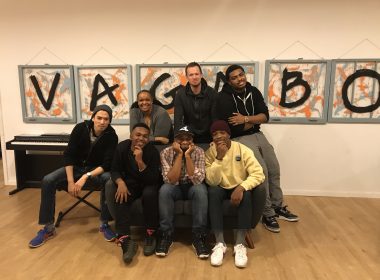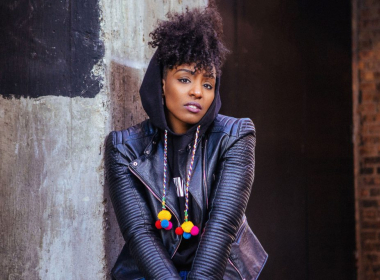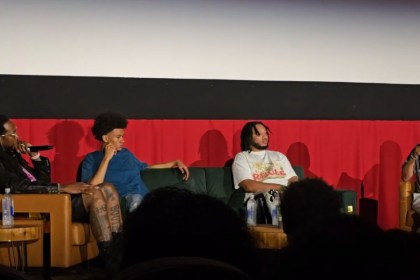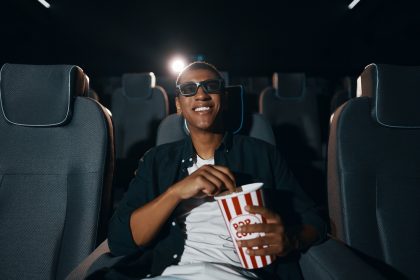
Armani Martin’s film Deus Ex Machina is timely. As the title suggests, the film is about Black oppression. It’s a portrayal of “a seemingly hopeless situation.” It’s much like the recent fatal shootings of three Black men in a four-day period: Alton Sterling, 37, in Baton Rouge on July 5, 2016; Philando Castile, 32, in Minneapolis on July 6, 2016; and Alva Brazile, 38, in Houston on July 8, 2016.
The daughter of a Chicago police officer, Martin knows the toll of violence. The seven-minute film showcases brutality faced by Black men and boys daily in America at the hands of police. In Deus Ex Machina, the audience follows a chained Black man, a slave, as he and two friends make their way to school. On the way, they are confronted by present-day conflicts many Blacks face on a daily basis, such as gang violence, poverty, police brutality and racial profiling.
Martin, 22, an Atlanta transplant, grew up in Chicago and has lost close friends to gang-related gun violence. She’s witnessed Chicago police kill Black men and boys in her neighborhood. Martin is a film festival favorite and made the list of the Top 20 Best Picture Film category for HBO’s Short film competition in conjunction with the American Black Film Festival. She also won best director at LA Shorts Awards. Read what she has to say.
How did you arrive at this career choice? Was it a deliberate decision or a gradual and natural evolution?
When I was six, I performed at the Apollo in Harlem, NY and that was when I knew the entertainment industry was for me. Later on, my cousin, F. Gary Gray, gave me the best advice anyone has ever given me and that was to make sure I was well-rounded on all spectrums of the entertainment industry so I never have to rely on someone else to keep a job. In high school, I took a video production externship at Gallery 37 in downtown Chicago and fell in love with writing and directing. Haven’t looked back since.
What separates you from others in your field? What is unique to the experience that you create?
In most of my stories, it has some type of social issue, whether my story is a regardless of the genre. My mission in life is to provide a vision for the people who haven’t seen. I attempt to take people into another dimension with my directing style; only to provide another reality, to provide something different.
For those considering entering this arena, what skill sets do you recommend mastering? What traits are most conducive to success?
Hustle, be a risk-taker and perseverance are the traits most conductive to success. You have to be willing to make anything happen, get anything done and to take chances in a steadfast manner.
How do you stay at the leading edge of your craft?
I read, I buy several books on Amazon. Directing films, are literally motion pictures because of that, I shoot photography as much as I can and buy magazines to study different art directions to open my mind vastly to the creative world.
Do you think that there are any widely held misconceptions about what you do? If so, what are they and how do you work to dispel them?
Most think you have to know someone or go to USC film school to be a successful director. The film industry is all about experience. I went to school and instead of waiting for my major classes, I bought Shot by Shot by Steven D. Katz. Of course, if you have the resources provided to spend the money on a film education or if you know someone to shadow and get you your first big job, then great. But those aren’t the only options to be successful.
How do you map out your goals? How do you measure your success?
Every year, I have a project schedule. I have a map of short term and long term goals and mini deadlines to see what I can or will accomplish in that yearly time frame so I can always stay busy and always learn.
Who do you consider to be your peers in your field? Who do you see or use as examples to emulate?
I’m a huge fan of Michel Gondry, so I attempt to emulate him often. I consider Benh Zeitlin a peer; he has simply amazing work and is an up-and-coming filmmaker such as myself.
Name two of your top role models: one from your industry and one from outside of it.
F. Gary Gray and my mother, Dr. Kimberly Martin.
Name three books, works, performances or exhibits that changed how you view life, yourself or both.
Sula by Toni Morrison, Random Family by Adrian Nicole LeBlanc and The Alchemist by Paulo Coelho.
Why do you consider continued learning important?
The world is changing and evolving every second. New life presents itself and so does death. If you’re not evolving and growing with the world and challenging yourself, you’re stunting your growth as a human being and as an artist.
Please define your personal brand.
My personal brand includes implementing the artistic journey of discovery and relevancy. To change the world socially, especially how women are perceived and how they perceive themselves.
If you could change one thing about the world, what would it be?
Since the beginning of time, the world has managed to divide itself by the amount of pigment in one’s skin. I wish we could all see each other has human first.
If you could change one thing about yourself, what would it be?
I have a shopping problem! Anything on sale, especially more than 40% off, it’s my weakness!
What does it take to be iconic? In your estimation, who has achieved that status?
Oprah has proven to be iconic. She has proven to love and care about others over the importance of money. She stands for something, she is a nonstop hustler, she is strong and proud.
What keeps you inspired?
Painting, reading, my family, art and films
What Scripture(s) are you leaning on?
Matthew (5:16) Let your light so shine before men, that they may see your good works, and glorify your Father which is in heaven.
How do you stay connected with fans?
Social media is a great place to connect and thank fans for keeping up with your works!
What’s on your playlist?
Chance The Rapper, Alex Wiley, Vic Mensa, Erykah Badu, Jill Scott, Cold Play, The Internet, Cat Power and Sia
















